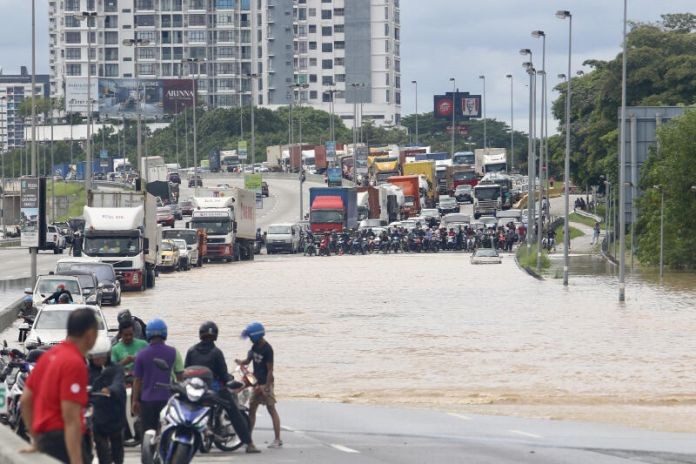
Image credit: The Business Times
OF the 35% of small and medium-sized enterprises (SMEs) in Kuala Lumpur and Selangor, the most severely affected by floods are those in Klang, Shah Alam and Ulu Langat.
While a few commercial banks and the Credit Guarantee Corp (CGC) have come up with disaster relief loans, online marketplaces like Shopee and Lazada can also create a digital space for those affected SMEs to sell their products.
Many of these SMEs had to stop business until today; factories are badly damaged with machineries covered by mud.
Stocks, especially raw materials, cannot be used anymore; many imported stocks are stuck in Port Klang with their quality in question.
Many farms were destroyed by the flood, and businesses with contracts to supply vegetables have to buy from third parties.
“The cost of doing business has gone higher; capital investment required to replenish new machineries and stocks is a burden to SMEs,’’ said SME Association of Malaysia national president HS Ding.
At RHB Bank Bhd, applications for aid amounted to RM46mil as at end-December, 2021, said RHB group community banking managing director Jeffrey Ng.
To date, a total of 69 affected customers have been identified by Bank Islam Malaysia Bhd’s SME banking and commercial teams.
“They are located in flood areas in the Klang Valley, Pahang and Kelantan; we expect to receive their applications for assistance beginning January 2022,’’ said Bank Islam group CEO Mohd Muazzam Mohamed.
Bank Islam has a loan moratorium of up to six months for customers affected by floods.
Many SMEs are still reviewing their immediate recovery efforts. Those who have called in to OCBC Bank (M) Bhd were given options which include CGC’s BizJamin70 (with a 70% guarantee by CGC), said OCBC head of emerging business, Wong Chee Seng.The floods had severely hit SMEs in Sri Muda, Shah Alam, where operations were also disrupted by a sub-station explosion.
“We are currently on a Tenaga Nasional Bhd mobile generator and have many issues to deal with involving insurance, claims, repair works, trouble-shooting as well as hygiene and sanitation works to adhere to Covid-19 standard operation procedures,’’ said Small and Medium Enterprises Association (Samenta) southern chairman, Louis Ooi.
In terms of asset losses, the most important are those work-in-progress and clients’ materials that are due for delivery; these can possibly incur liability costs.
Overall asset losses cover goods and stocks, furniture and fittings, machinery and instruments, electrical fittings and wiring, vehicles and parts, hardware and software as well as documents and records.
“In terms of supply chain disruption, many SME manufacturers in the south depend on goods, parts and engineering support services from the Klang Valley. The floods indeed had hindered the economy here alongside the Omicron outbreak,’’ said Ooi.
The disaster has affected 12,000 to 18,000 Samenta members in the southern area, with many reporting severe damage running into millions of ringgit.
“Going forward, SMEs should be more aware of risk management with affordable coverage for such perils,’’ said Samenta national secretary Yeoh Seng Hooi.
Expediting the payment of insurance claims will help, as SMEs need sufficient funds to clean up and restart their businesses.
“Marketplaces like Shopee and Lazada should waive the commission and fees for affected SMEs to sell online for at least three months.
“A separate ‘digital shop floor’ can be created for the affected SMEs, while consumers can support these companies via their purchases,’’ added Yeoh.
Regarding the disaster relief facility, SME Association of Malaysia has checked with a few banks and hopes that clear guidelines can be issued as soon as possible.
Insurance companies will hopefully allow or help to ease the process for claims involving repairs for machinery, as well as losses in stock and businesses.
“Insurance companies should also give special approval for SMEs that are located in areas not covered by insurance, to claim.
“Banks should also allow affected SMEs to defer repayment of factory loans and leasing facilities, without affecting their integrity.
“More credit facilities can be extended to affected SMEs, including overdrafts and leasing facilities at lower interest rates,’’ said Ding.
While many corporate companies are already helping affected housing areas, they can also help to clean up small shops and factories.
The local and state governments can help by waiving quit rent, as well as assessment and trade licence fees for the year to come. This will relieve SMEs as they try to recover from the floods as soon as possible.
“The government can also clean up the rivers and develop sustainable structural mitigation plans to prevent future floods,’’ said Ooi.
These include the building of retention ponds, pump stations, dams and floodwalls.
“The private sector can help by not dumping debris into the rivers. Awareness on water pollution is still low, and I have seen people conveniently throwing debris into the river,’’ said Ooi.
While affected SMEs struggle to regain their businesses, they have to consider measures for long term sustainability. The government has to move quickly to step up on flood mitigation following the occurrence of severe floods.
Source: https://www.thestar.com.my/business/business-news/2022/01/04/insight---smes-incur-extensive-damage-from-floods

